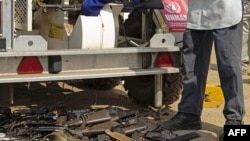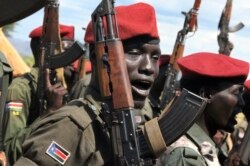South Sudan’s Vice President Rebecca Nyandeng de Mabior is calling on the United Nations to lift its three-year-old arms embargo on South Sudan.
De Mabior, scheduled to address the United Nations General Assembly on Friday, told VOA in an exclusive interview that the embargo hinders implementation of South Sudan’s 2018 peace agreement, specifically the training and equipping of soldiers in a unified national army.
“We are going to graduate them with sticks and then you just send them to the community, they will not go to the barracks,” she said in the interview. “What controls the soldier is his gun or her gun.... So, if the arms embargo is there, how does the U.N. expect us to arm those people they’re telling us to graduate?”
Building an army made up of fighters from South Sudan’s formerly warring parties is considered a key aspect of the 2018 peace deal that ended the country’s civil war.
De Mabior says some 53,000 troops have been trained, and now await integration into that unified national force.
Problems with South Sudan government
In a scathing report issued from Geneva this week, a U.N. body said South Sudan is suffering a human rights crisis of epic proportions, citing alarming levels of conflict in nine of the country’s 10 states.
The report from the U.N. Commission on Human Rights in South Sudan documented the prevalence of enforced disappearances, torture, rape, and conflict-related sexual violence and the forced recruitment of child soldiers throughout the country.
A separate commission report dealing with economic crimes accuses South Sudanese political elites of illicitly diverting millions of dollars from public coffers into private bank accounts.
De Mabior said she understands the international community’s dissatisfaction with the performance of South Sudan’s government.
“I’m not coming here to deny what was happening in the country nor to defend what is going on,” she told VOA. “Yes, we had some problems, and with these difficulties we are going through, our people are expecting so much from the government.”
“What happened for many years now cannot just be overcome overnight. It’s a process and we are asking our people to be patient with us,” she added.
Noting the slow pace, Juba-based political analyst James Okuk told VOA last week that only 10% of the tasks in South Sudan’s 2018 peace agreement have been implemented three years after signing the deal, and that the Chapter II security arrangements are a sticking point.
As for South Sudan’s economy, de Mabior argued that her government has made visible progress.
“If you go to Juba now the economic indications are showing. The IMF has helped us, so now we have balanced the exchange rate,” and she noted through IMF loans her government has been able to curb South Sudan’s soaring inflation and give some back pay to civil servants.
She also said the South Sudan National Revenue Authority has digitized the system of revenue collection and eliminated illegal “taxation” roadblocks.
De Mabior, who is also chair of the Gender and Youth cluster in the executive government, told VOA, “We are working to see to it that the representation of women is realized. There are some problems yes, like, for example, in the executive the percentage is 26% and it was supposed to be 35%, and also in the parliament - but the parliament is much better than the executive.”
South Sudan’s peace agreement guarantees 35% percent representation for women at all levels of government, a commitment that President Salva Kiir’s government has come up short of fulfilling in all government institutions.
Women underrepresented
Being the first and only female vice president in South Sudan among the five officials holding that title, de Mabior says “At least this percentage in the presidency is OK because it’s a place that we were not reaching [before]. And you know women are reasonable people,” she told VOA, “Coming out of tradition and culture in the country which are oppressing women, we are [now] much better.”
She admitted that fulfilling the 35% women’s representation guarantee remains problematic. “I know that there are these problems, but the most important [thing] for us now is for our children to be secure.”
Fragile peace
South Sudan’s civil war began in December 2013, just two years after the country gained independence from Sudan, when President Kiir accused his former First Vice President Riek Machar of attempting a coup against him.
South Sudan’s major warring parties signed a new peace agreement in 2018 after the collapse of a 2015 peace agreement that plunged the country back into violence.
Some armed groups refused to sign the 2018 peace deal and a recent division within the forces of Machar (SPLA-IO) is threatening an already fragile arrangement.
South Sudan’s first female vice president brings optimism and determination to her position, but her goals face headwinds the nation has yet to overcome in its 10 years of independence. Nonetheless, she tells VOA, she vows to press forward.
“We need to make sure as a government we implement this agreement, there’s nothing else as I stated earlier,” she said. “The whole world is tired of us, even our own people are getting tired, but they have to be patient and to give us another chance so that we implement this agreement. There’s no shortcut to freedom. If they want freedom and they want to be secure in their own country, we have to walk this rough road.”
Lisa Schlein in Geneva contributed to this report.





